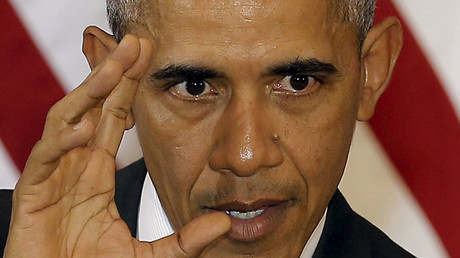US army official berates Australia for indecision over Washington & China ties

U.S.
President Barack Obama and Chinese President Xi Jinping © Kevin
Lamarque / Reuters
RT,
1 September, 2016
A
top US military official has said that Australia should choose
between stronger ties with Washington or Beijing, stressing that
there has to be “a decision as to which one is more of a vital
national interest.”
"I
think the Australians need to make a choice ... it's very difficult
to walk this fine line between balancing the alliance with the United
States and the economic engagement with China," US
Army Assistant Chief of Staff Colonel Tom Hanson said on radio
station Australian Broadcasting Corporation.
"There's
going to have to be a decision as to which one is more of a vital
national interest for Australia," he dded.
Hanson
blasted the lack of protest by Australia against Chinese maneuvers in
the South Sea, saying that Beijing “clearly
… believes that they have an opportunity and they feel empowered to
flout that.”
The
official hurried to mention, though, that the views were his own, and
not those of the US government.
Hanson’s
statement came after the publication of a 205-page parliamentary
briefing book on Tuesday which warned Australian MPs to treat China’s
pursuit of "legitimate
interests" with
caution.
"Australia
needs to adopt a more economically and strategically prudent attitude
in determining how the Australia-China economic relationship is to
further develop,"
the booklet read.
Meanwhile,
the country’s former PM Paul Keating has accused Canberra of
lacking a strong foreign policy position with regards to the China-US
battle for influence in the region.
"Australia
needs a foreign policy, and it needs it urgently. Australia does not
have a foreign policy,"
he said talking in Sydney on Tuesday.
"We
both need and deserve a nuanced foreign policy which does take
account of these big seismic shifts in the world. And we can't ever
be caught up in some containment policy of China ... to assist the
Americans in trying to preserve strategic hegemony in Asia and the
Pacific."
In
response, Foreign Minister Julie Bishop said that the US role in the
Indo-Pacific region is as essential as ever and Australia is
committed to the primacy of the US alliance.
"We
are balancing relationships between our largest strategic ally and
our largest trading partner with deft diplomacy, consistency and
pragmatism,” Bishop
said.
Currently
China is Australia's largest two-way trading partner in goods and
services valued at $155.5 billion in 2015, according to the
Australian Department of Foreign Affairs and Trade. The two countries
signed a free trade agreement which entered into force in December
2015 boosting growing trade and enhancing an investment relationship.
Increasing numbers of Australian businesses have been entering the
Chinese market in the past years with great success.
Left
wing political forces in Australia “used
to stick to the position that Australia should take a mid-course
between the US and China,” Gregory
Clark, a former Australian diplomat, told RT, adding that the former
prime minister, Kevin Rudd, had been “the
chief proponent of that idea.”
However, “the
US used its influence to have him pushed out of the office and then
replaced him with the one, who is strongly pro-US on this question
with China,” Clark
added, emphasizing that public opinion in Australia is now strongly
pro-US.
He
also stressed that “this
move by a US official … signifies the beginning of a fairly intense
struggle to push Australia in one direction or another,” adding
at the same time that “Australia
will continue its current policy – it will join America in these
provocative Freedom of Navigation Exercises but probably will refrain
from doing it by itself.”
“Until
China imposes economic sanctions against Australia, Australia will
not move in a pro-Chinese direction,” he
said.




No comments:
Post a Comment
Note: only a member of this blog may post a comment.